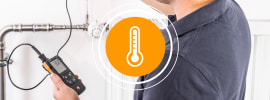- Home
- testo 420
testo 420 - air capture hood
Product no. 0563 4200








testo 420 - air capture hood
Product no. 0563 4200Your advantages
Air capture hood for larger swirl outlets for measuring air capture, temperature and relative humidity
Impressively light with a weight of 2.9 kg
Precise measurement even at swirl outlets thanks to integrated air capture straightener
Fast set-up, convenient operation and protocol creation on site using the App
Make sure you get the testo 420 air capture hood for larger ceiling outlets and at the same time enjoy multiple maintenance benefits on HVAC systems. Because the capture hood with the removable measuring instrument is not only exceptionally light, it also guarantees accurate air capture calculations at swirl outlets
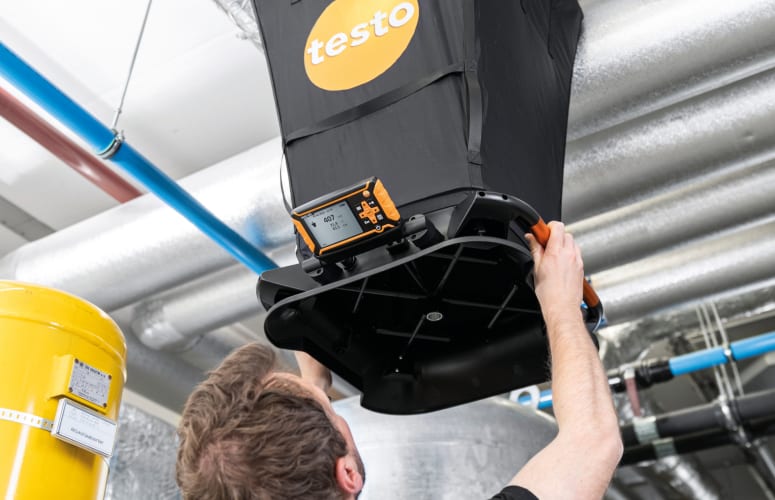 Volume flow hood weighing less than 2.9 kg
Volume flow hood weighing less than 2.9 kg
Description
High measuring accuracy at swirl outlets thanks to air capture straightener
Air capture is frequently measured at swirl outlets. Air flows are often incorrectly measured due to the turbulent air at these outlets.
The testo 420 air capture hood means you can significantly reduce these measurement errors. The integrated air capture straightener calms the turbulence and converts it into a virtually uniform air flow. This enables accurate calculation of air capture in the 80 to 3,500 m3/h range.
Exceptionally light air capture hood with fast set-up
The air capture hood with ergonomic handles and tiltable display has an exceptional weight of less than 2.9 kg. This means that frequent air capture calculations in large rooms and measurements above head height can also be carried out reliably and comfortably. In the process, a large measuring button on the air capture hood ensures easy recording of the readings.
The dimensions of the hood are 610 x 610 mm. We offer additional hoods as accessories for further ceiling outlets. The use of our optional tripod arm is a great help for air inlets and outlets which are located very high up. It can be extended up to 3,3 metres.
The air capture hood is quick and easy to set up thanks to tension rods. The trolley which is included in the scope of delivery ensures safe transport.
Create protocols directly on site and mail them using the App connection
Take advantage of further practical functions and download our free App. Because the App connection enables mobile devices such as smartphones and tablets to be used as a secondary display and remote control via Bluetooth. This is particularly practical for using a tripod arm for high ceilings.
The App enables live measurement on HVAC systems using a start and stop function and the saving of measurement data in txt format. You can create the measurement protocol directly on site using the App. Measurement results, such as the overall air capture and the air exchange rate, can be directly assigned to customer-specific protocol templates. You can then send your readings and protocols via the e-mail function. This means you save a considerable amount of time and increase efficiency.
Air capture hood with removable measuring instrument - performance overview
The air capture hood for HVAC systems is equipped with a measuring instrument for displaying measurement data. The device can be tilted and removed for user-friendly reading of measuring values.
The testo 420 measuring instrument enables you to measure flow velocity, air capture, absolute pressure, temperature and relative humidity. The automatic zeroing ensures higher accuracy for low pressures.
All measuring values are easy to read on the large display which has an illumination function. For analyses and documentation, measurement data can be saved and measurement protocols created directly on site using the App connection. Administration of the measurement data is very easy on the PC without any additional software via the plug & play function.
The testo 420 air capture hood with its integrated measuring instrument was not just developed for air capture measurement at larger ceiling outlets. The measuring instrument can also be taken off the hood and used for pressure, flow and air capture measurements in the duct. This means you can save on the purchase of an additional measuring instrument.
You merely have to attach a Pitot tube and connection hoses (both optional) for measurements in ducts. Timed and multi-point mean calculation, as well as the combination of the two, together with simple input of the duct geometry provide you with support for measurements in ducts.
Delivery Scope
testo 420 air capture hood including measuring instrument, 610 x 610 mm hood, 5 x tension rods, USB cable, batteries, trolley and calibration protocol.
Related Products
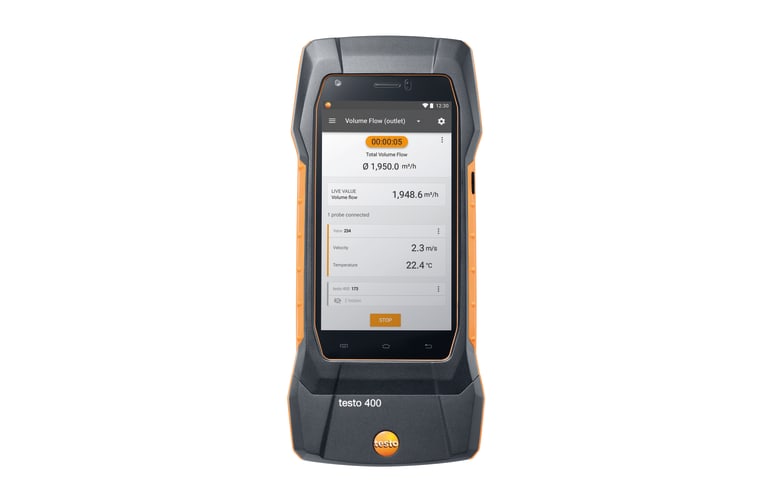
testo 400 - Universal IAQ instrument
Product no.:
0560 0400
0560 0400
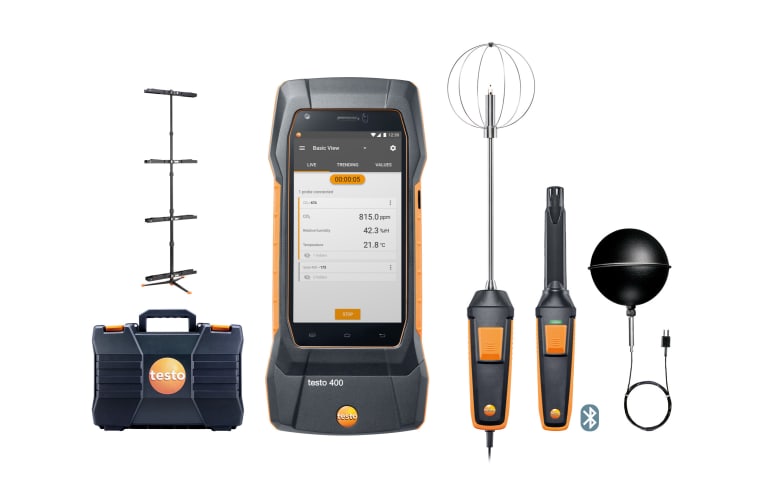
testo 400 IAQ and comfort kit with tripod
Product no.:
0563 0401
0563 0401
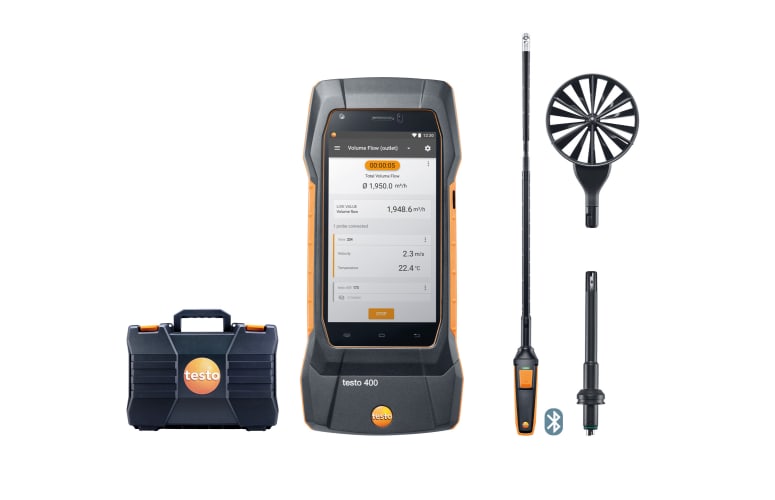
testo 400 air flow kit with 16 mm vane probe
Product no.:
0563 0400 72
0563 0400 72
Technical data
Temperature - NTC
| Measuring range | -20 to +60 °C |
|---|---|
| Accuracy | ±0.8 °C (-20 to +0 °C) ±0.5 °C (0 to +60 °C) |
| Resolution | 0.1 °C |
| Reaction time | 45 s (t90) |
Humidity - Capacitive
| Measuring range | 0 to 100 %RH |
|---|---|
| Accuracy | ±1.0 %rF/year Drift ±0.03 %RH/K (at 0 to 60 °C ) ±1.0 %rF Hysterese ±1.8 %RH +3 % of mv (at 25 °C, 5 % to 80 %RH) |
| Resolution | 0.1 %RH |
Differential Pressure - Piezoresistive
| Measuring range | -120 to +120 Pa |
|---|---|
| Accuracy | ±2 % of mv + 0.5 Pa at +22 °C, 1013 hPa |
| Resolution | 0.001 Pa |
| Reaction time | 1 s (t90) |
Accessories
Additional accessories and Spare parts
Additional accessories and Spare parts
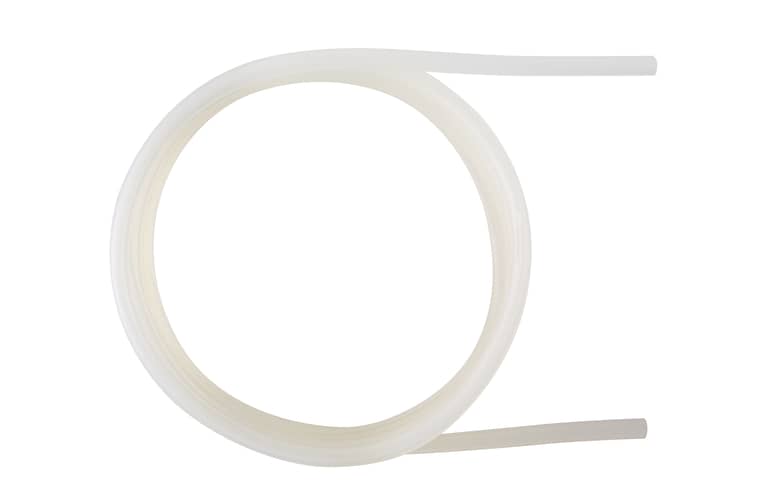
Connection hose, silicone - max. load capacity up to 700 hPa (mbar)
Product no.:
0554 0440
0554 0440
Rs 6,230.00
Additional accessories and Spare parts
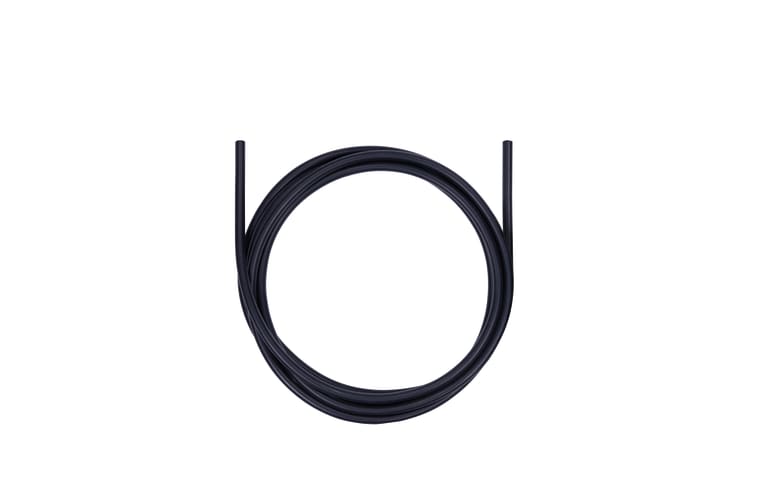
Connection hose silicone-free for differential pressure measurement, length 5 m, load up to maximum 700 hPa, (mbar)
Product no.:
0554 0453
0554 0453
Additional accessories and Spare parts
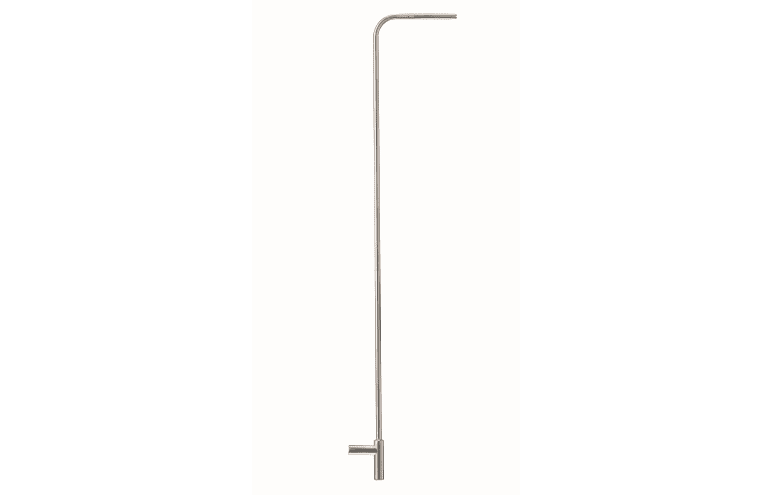
Stainless steel Pitot tube, length 500 mm, Ø 7 mm - for measuring flow velocity
Product no.:
0635 2045
0635 2045
Rs 18,325.00
Downloads
Product brochures
- Data sheet testo 420(pdf, 3.82 MB)
Operating instructions
- EU declaration of conformity testo 420(pdf, 34.32 kB)
- Instruction manual testo 420 (volume flow hood)(pdf, 1.41 MB)
- Startup instruction testo 420(pdf, 718.61 kB)
- Instruction manual: Velocity matrix with telescope for testo 420(pdf, 871.54 kB)





